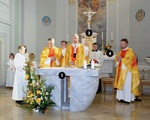The Cross tells us that Death is not the end
MOUNTAINTOPS AND MARKET PLACES
The Cross tells us that Death is not the end
On top of many steeples, mountaintops, and in many public Austrian places you find crosses. The cross is the most important symbol for Christians, and many Christians wear crosses in the form of jewelry, or hang crosses on the walls of their rooms.
Why do they have crosses? Christians believe that God became human in Jesus Christ to help people find God in a new way. Jesus healed the sick, revived the dead and revealed God’s infinite mercy and love. Jesus’ opponents put him to death on the cross. The Bible tells us that Jesus did not condemn them, but asked God to forgive them and all the people. Love is stronger than hate, violence, suffering and death. The Bible tells us that Jesus’ followers, right after his death, experienced this: Jesus Christ had risen from and defeated death. So, for a Christian, the cross is no longer a symbol of humiliation and death, but is now the symbol of benediction, love and life. It serves to remind all Christians that the greatest form of love is love for your enemies. It is the only way of breaking the circle of hostility, hatred and violence. The resurrection of Jesus Christ gave his followers the courage to preach the Gospel all over the world.
Jesus Christ did not sacrifice others, but gave his own life. Christians are called upon to do the same – to "bear one’s cross" – to stand up for others, avoiding any form of violence. Therefore the Christian cross is the symbol of trusting in God who promises life after death.
The sign of the cross is commonplace in Christian life: with your right hand, you touch your forehead, your chest, and both shoulders to show the trusting dedication of your whole being – intellect, heart, will – to the sign of Jesus Christ. Christians make the sign of the cross at the beginning of their prayers and celebrations, when they enter a church or when they are blessed by a priest. It is a sign of faith and the shortest version of Christian prayer (some soccer players for example make the sign of the cross before shooting a penalty to ask God for good nerves). Non-Christians, however, are not expected to make the sign of the cross for reasons of politeness etc. There are also other Christian signs all over Austria, e.g. statues of saints. Mostly made of stone, sometimes made of wood, they depict holy men and women (‘saints’) who are taken as examples for leading good and righteous lives. Christians believe that these holy people are already in heaven, in the presence of God, and are therefore important intercessors and often asked for help. The first people believed to be holy in this way were the martyrs: they remained true to their faith and abstained from violence, even when others threatened to take their lives.
more articles of the brochure
 |
All together there are more than 4000 churches in Austria. Most of the time, they are among the oldest and most beautiful buildings in a village and protected by federal monument conservation. |
 |
Churches are open to all people, even if there is no religious service at the time. |
 |
The Bible is the foundation of christian faith. Over the centuries, people have passed on their experiences of God by telling others and writing them down. |
 |
How Christianity shapes human Life Christianity has many ways to express how God accompanies the daily life. The ways of celebrating Catholic feasts have formed Austrian culture and the lives of the faithful for centuries. |
 |
Equal Dignity of all Men and Charity as a Mission The basic values of Christianity are love for God and love for your neighbors. Christians are commanded by Jesus Christ to love their enemies and pray for them. |
 |
How Christianity structures the Year Christian feasts have served as the foundation of Austrian culture for centuries. The borderline between secular and religious customs is not always easy to draw. |

